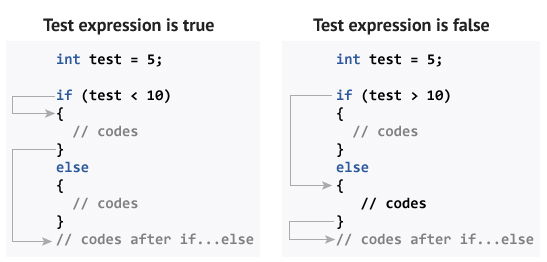An if statement contains a Boolean expression and block of statements enclosed within braces.
Structure of if statement
if (boolean expression )
/* if expression is true */
statements... ; /* Execute statements */
if...else statement
If statement block with else statement is known as as if...else statement. Else portion is non-compulsory.
Structure of if...else
if(condition)
{
  statements...
}
else
{
  statements...
}
If the condition is true, then compiler will execute the if block of statements, if false then else block of statements will be executed.
Nested if...else statement
We can use multiple if-else for one inside other this is called as Nested if-else.
Structure of Nested if...else
if(condition)
{
  statements...
}
else if
{
  statements...
}
else
{
  statements...
}
6.2 Conditional selection - switch NEXT >>
 if statement
if statement